Canada's Senate Passes Motion To Designate IRGC
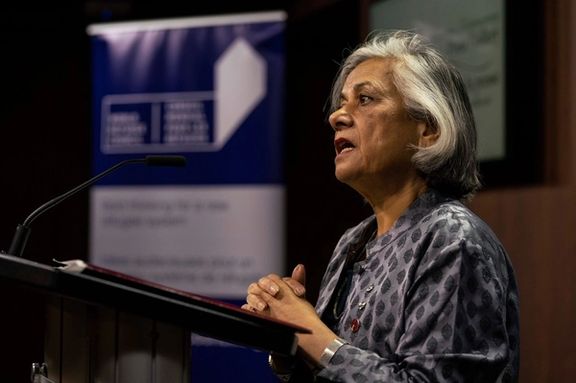
Canada's Senate has passed a non-binding motion to designate Iran’s Revolutionary Guards as a terror organization.

Canada's Senate has passed a non-binding motion to designate Iran’s Revolutionary Guards as a terror organization.
Fierce campaigner Senator Ratna Omidvar who has been leading the charge, stressed that “the crimes of the Islamic regime and the IRGC go beyond the borders of Iran", citing the contribution of the IRGC to Russia's brutal invasion of Ukraine, for which Iran has supplied kamikaze drones.
“They [the IRGC] have been deployed more than 90 times against a civilian population,” added Omidvar --who experienced the turbulence of Iran’s Islamic Revolution while living there before moving to Canada -- highlighting that “Iran and the IRGC fund and support Hamas and Hezbollah, creating significant regional instability".
In June 2018, the Canadian parliament passed another similar motion, introduced by MP Garnet Genuis, to designate the IRGC but the government did not follow up on the action.
So far, Canada has only designated the Quds Force, the extraterritorial arm of the IRGC, but has been reluctant to list the IRGC as a foreign terrorist group.
Canadian officials said last year that the designation would be too much of a “blunt instrument” that could punish innocent people in Canada who were conscripted into the IRGC as part of their mandatory military service.
In November, Prime Minister Justin Trudeau said Canada has designated Iran's IRGC leadership, adding that “we will restrict financial transactions with the Islamic Republic of Iran associated with the IRGC and the proxies that support them. These actions are some of the strongest measures anywhere against Iran.”
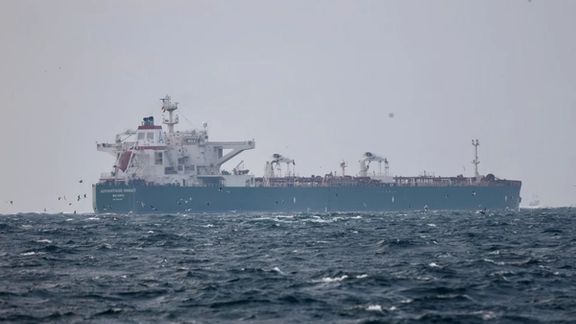
Several US senators backed the Biden administration's move to seize Iranian oil tankers at Panama Canal, calling for more measures to stop export of Iran’s crude.
Senator Bob Menendez (D-NJ) told Iran International’s Arash Aalaei he "applauds" the seizure and he "hopes they'll have many more."
He added that this is a message to Iranians warning them that they cannot ultimately divert their oil and violate embargoes imposed on their oil trade.
Senator Tim Kaine (D-VA) told us that he supports the Biden administration's seizure of Suez Rajan tanker carrying Iranian crude oil, lauding it as “a very strong move.”
“Iranian aggression in many ways, including supplying drones to Russia to facilitate an illegal war in Ukraine, the behavior of Iran both to its own people and beyond the borders, is getting worse and worse and worse,” he noted.
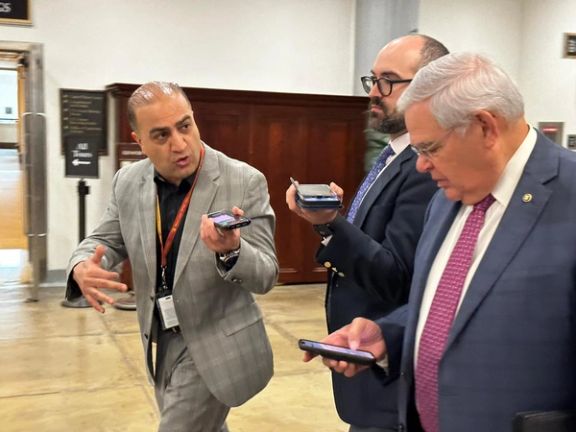
The US this year quietly seized two tankers suspected of transporting Iranian oil as part of an elaborate sanctions-busting scheme involving forged documents and the repainting of a ship’s deck to cloak illegal shipments.
Details of the seizures are scarce and sketchy. It is not clear if the two tankers were seized at the same and at the same location or were two separate incidents.
One thing which is clear, both vessels — the Cyprus-flagged Arina and Liberia-flagged Nostos — tried to discharge the oil at a storage facility in Turkey, according to the New York-based group United Against Nuclear Iran. Instead, they were detected by US authorities and ordered to unload their cargo, which the Nostos did in Houston around Thanksgiving last year and Arina more recently, in January, in Bahamas, according to the AP. Arina, which was formerly Panama-flagged and its last listed manager is Athens-based Saint James Shipping Ltd., had previously been known to ship illegal Iranian crude, US attorneys allege in a civil complaint filed in Washington federal court.
As Iran’s illicit oil exports began to rise after President Joe Biden’s election in 2020, many US lawmakers began criticizing the administration for lax enforcement of sanctions. Some have accused the Biden team of having been soft on Iran with hope that negotiations to revive the JCPOA nuclear agreement would succeed.
The seizure of Iranian crude took place as there are unconfirmed reports that the Biden administration seeks to revive a 2015 nuclear deal with Iran via an impending interim deal, which would likely entail the US lifting sanctions. If this is true, the US may be able to balance the market thanks to Iranian oil while its sanctions on Russia removed a large portion from the market. Some of that lost supply could be made up by Iran, which – according to the AP -- pumped an average 2.4 million barrels per day in 2021 though due to sanctions has been able to sell less than half of what it produces.
The administration of Ebrahim Raisi claims to have increased the oil exports but its results have not been felt in the country’s economy as the national currency has been losing its value and society is struggling with record high inflation.
On Wednesday, US Senators Marco Rubio (R-FL), Maggie Hassan (D-NH), and Jacky Rosen (D-NV) introduced the Stop Harboring Iranian Petroleum (SHIP) Act, which would sanction illicit purchases of Iranian oil and hold the regime’s enablers accountable.
The act is supposed to target Iranian oil sales to Chinese refineries, which have been the main importers of Iran’s oil. “Iranian oil sales to China’s genocidal regime fund the Ayatollah’s ability to repress Iranian protesters,” read part of a statement to announce the act, adding that as of February 2023, Chinese refineries were processing, refining, or engaging with approximately 1.2 million barrels of Iranian oil per day.
Senator Menendez told Iran International that he cannot comment on the specifics of the legislation yet but added that in general, he supports “efforts that try to stop the Iranian regime from profiting at the expense of their own people.”
“As the regime in Tehran continues to enrich itself through the sale of sanctioned oil, we must ensure that US sanctions on all individuals and entities linked to the illicit trade of Iranian oil are rigorously enforced,” Rubio said.
“We must do everything that we can to prevent Iran from building a nuclear weapon and stop its support of terrorism. This bipartisan legislation will strengthen sanctions on Iranian oil - a key revenue source for the regime - and make the United States and our allies, including Israel, safer,” Senator Hassan said in the statement to announce the act.
“This bipartisan legislation will strengthen sanctions on ports and refineries that receive and process Iranian oil and will help reign in Iran’s ability to engage in destabilizing activities,” Senator Rosen noted.
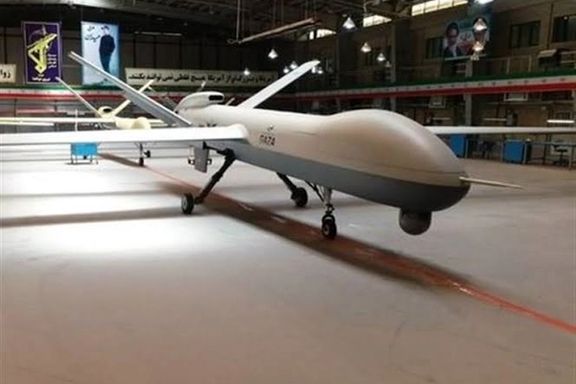
Scientists at some of Britain's top universities helped Iran develop drones and fighter jets in spite of sanctions against the regime.
The revelations were revealed in the UK's Jewish Chronicle newspaper, sparking outrage among lawmakers.
A government spokesperson said Britain would not "accept collaborations which compromise our national security" while David Lammy, the Shadow Foreign Secretary, said the investigation by the JC was "deeply troubling" and called for an urgent investigation into sanctions violations.
Meanwhile, Alicia Kearns MP, chair of the Commons Select Committee on Foreign Affairs said: “This is a horrifying collaboration, one that I fear risks breaching sanctions in place around sensitive and dual-use technologies.”
At least 11 British universities are involved, including Cambridge University and Imperial College London, whose staff are producing at least 16 studies that could be used by Iranian military forces.
In addition to its ban on military and "dual-use" technologies being exported to Iran, the UK has recently imposed new sanctions against Iranians supplying Russia with kamikaze drones that are being used in Ukraine.
According to the Jewish Chronicle, Tehran funded researchers in Britain working on improving drone engines in a project that boosted altitude, speed, and range.
Another British university partnered with Iranian counterparts to test sophisticated new control systems for jet engines, aimed at improving their "maneuverability and response time".
A number of MPs have requested details about how the research, including projects which could boost the technology being sold to Russia in its war in Ukraine, was conducted under the nose of the government's supposedly tough sanctions regime.
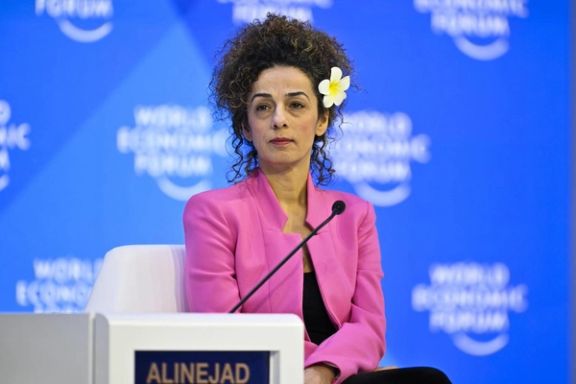
Masih Alinejad, a political activist, slammed the relocation of Iran International’s activities from the London office to Washington due to the UK’s inability to protect its citizens on its soil.
In an article in Time magazine, she urged the British government to take more measures to stop the IRGC and its terrorist activities around the world.
“The situation in the UK had already become so dire that Iran International—a Persian language media outlet which has invited the chagrin of the regime for daring to beam reliable news into Iran via satellite—was forced to flee the UK,” added Alinejad.
She went on to question how the UK, with one of the most sophisticated security apparatuses in the world, cannot even protect people on its own soil.
The authorities of the Islamic Republic have repeatedly threatened Iran International and its employees, significantly following the coverage of the Iranian people's uprising in recent months.
Alinejad, who has had multiple threats on her life from the IRGC and was recently under 24-hour police protection during a UK visit, said: “The UK has not even punished the Islamic Republic after its own citizens were maimed and killed. For instance, in July 2021 after the IRGC’s Aerospace Force attacked the Mercer Street commercial vessel killing two European nationals, including one British citizen, not even one sanction was levied on the Islamic Republic.”
The challenge facing Europe is not only about protecting its own citizens but also about standing up for the values of freedom, democracy, and human rights, underlined Alinejad.
She said by designating the IRGC as a terrorist organization, the UK prime minister can send a powerful message that he will not tolerate state-sponsored terrorism and will defend those who fight for justice and liberty.

The US State Department Wednesday dismissed media reports about secret talks with Iran for a possible nuclear deal, calling them rumors.
Principal deputy spokesperson Vedant Patel in response to a question about a Haaretz report saying talks have made progress said, “I’m certainly not going to respond to rumors or leaks of diplomatic conversations, which of course have a tendency to be false and misleading.”
In recent weeks the State Department has used the same exact formulation to characterize many media reports about some sort of indirect negotiations with Tehran, whether on the nuclear issue or securing the release of American hostages.
Haaretz reported Wednesday that Israel believes secret talks are taking place possibly to reach a limited or partial deal, whereby Iran would reduce the level of its uranium enrichment in exchange for the release of around $20 billion of its funds frozen in Iraq, South Korea and its share of withdrawal from the International Monetary Fund.

The chief of Iran’s central bank was visiting the IMF in Washington last week and Iranian media quoted him as saying that Tehran could withdraw around $6 billion of its contributions.
If true, $20 billion seems like a big amount, but in reality, it will help the Islamic Republic for a few months amid its economic crisis and is not a fundamental solution to its domestic instability.
However, already the battered Iranian currency, the rial, has begun to rise in the Tehran foreign currency market, possibly driven by anticipation of a diplomatic breakthrough. The US dollar fell below 500,000 rials late on Wednesday for the first time since March 28. It has risen by more than 10 percent in recent weeks.
Spokesperson Patel also repeated the same public policy formulations that the Biden administration has been using on the Iran topic - the US will not allow Iran to gain nuclear weapons, but it believes the best way to achieve that goal is through diplomacy.
However, Israel strongly opposes any partial deal with Iran that does not fundamentally remove the danger of Iran building nuclear weapons. Prime Minister Benjamin Netanyahu once again warned on June 4 that Israel is preparing for a multi-front conflict if it decides to attack Iran’s nuclear installations.
“The latest statements are probably a response to an American effort to reach some sort of an agreement with Iran,” Maj, Gen. Yaakov Amidror, senior fellow at the Jerusalem Institute for Strategy and Security and former national security adviser to Netanyahu, was quoted as saying this week.
“The Israeli statements are also aimed at Iranian ears, that should they cross a certain line, Israel will respond, and does not see itself committed to any international agreements reached with Iran,” he added.
Iranian officials have repeatedly claimed in recent months that indirect contacts with Washington continue to rekindle nuclear talks that were suspended last September after 18 months of unfruitful diplomacy. The Biden administration long denied any talks, even calling Iranian officials liars at one point. But media hints about a partial deal being discussed have surfaced since February.
Tehran’s release of three Western hostages last week, and lack of a Western attempt to table a resolution against Iran this week at the board meeting of the UN’s International Atomic Energy Agency, could be signs of secret dealings.

The UK, France, Germany, and the US debunked Tehran’s explanations on its nuclear dossier at the UN watchdog, the IAEA, wrapped up its discussions on Iran with no resolution.
On Wednesday, the E3 as well as the United States submitted separate statements to the International Atomic Energy Agency's board of governors over the Islamic Republic’s implementation of its obligations under its NPT Safeguards Agreement, noting that the answers that Tehran provided over the cases of uranium traces are not technically credible.
However, diplomats told Iran International’s Vienna correspondent that no resolution or even any specific statement to censure Iran’s activities and lack of cooperation is expected by the IAEA board of governors.
The E3 said Iran’s activities such as centrifuge configuration changes at Fordow without prior notice to the IAEA and detection of particles of uranium enriched at 83.7% took place in the context of over four years of a lack of substantive cooperation with the IAEA regarding possible undeclared nuclear material three undeclared locations in Iran two decades ago.

Referring to the three earlier resolutions by the IAEA board against Iran, the latest in November, the E3 said that the IAEA decided it is “essential and urgent” that Iran act to fulfil its legal obligations and clarify all outstanding safeguards issues without delay. "Iran’s longstanding lack of cooperation with the Agency, incremental and limited steps are neither sufficient nor satisfactory,” read the statement.
Calling on the IAEA to continue to demand full transparency from Iran on all outstanding safeguards issues, the E3 wondered why the agency’s assessment of the issues remains the same but the agency has no additional questions on the depleted uranium particles.
Agency’s assessment of Iran's activities was that it conducted explosive experiments at the Marivan site. This assessment has not changed yet.
The US said in its statement that “The Agency now says it has no further questions related to two of the four sites at this stage, but this does not constitute 'closure' of these files, as some have inaccurately claimed.”
The European states also expressed great concern that the agency reports no progress towards resolving the remaining outstanding safeguards issues pertaining to Turquzabad and Varamin sites.
“Unless and until Iran provides technically credible explanations to the Agency’s persisting outstanding questions, as reiterated by the November Resolution, the Agency will not be able to confirm the correctness and completeness of Iran’s declarations under its NPT Safeguards Agreement,” E3 added.
They went on to point out other issues such as limited steps towards reinstallation of enrichment monitoring devices at both Fordow and Natanz.
Echoing the same concerns, the US also said “Regrettably, Iran’s level of cooperation to date has fallen short.” “The absence of this assurance remains deeply concerning, especially considering more recent safeguards implementation issues in Iran,” it added.
The fact that despite all the open cases the IAEA board of governors did not issue any resolution against the Islamic Republic may be a sign that the regime is about to finalize a nuclear deal with the US behind the scenes.
During the past few weeks, reports have surfaced that Tehran and Washington have been in close – yet indirect – contact with each other to reach an interim agreement.
Earlier in the day, Haaretz reported that Israel expects an interim agreement to be reached within a few weeks, expected to include an Iranian agreement to stop uranium enrichment at high levels in return for releasing Iran's frozen funds.
After all, it was the US and the E3 that spearheaded past IAEA resolutions, and this time as in March, they sufficed by issuing statements.
Mehrzad Boroujerdi, vice provost and dean of College of Arts, Sciences and Education at Missouri University, told Iran International that considering the increasing communication between Tehran and Washington and the developments at the IAEA board meeting, the Haaretz’s report can be true.